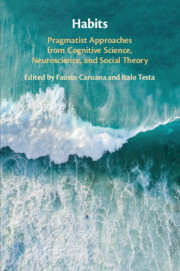Book contents
- Habits
- Habits
- Copyright page
- Contents
- Contributors
- The Pragmatist Reappraisal of Habit in Contemporary Cognitive Science, Neuroscience, and Social Theory: Introductory Essay
- Part 1 The Sensorimotor Embodiment of Habits
- Part II The Enactment of Habits in Mind and World
- 7 The Backside of Habit
- 8 Habit, Ontology, and Embodied Cognition Without Borders
- 9 Clarifying the Character of Habits
- 10 Habits, Meaning, and Intentionality
- 11 Language, Habit, and the Future
- 12 Moral Habit
- 13 Habits of Goodness
- Part III Socially Embeddded and Culturally Extended Habits
- Index
- References
12 - Moral Habit
from Part II - The Enactment of Habits in Mind and World
Published online by Cambridge University Press: 24 November 2020
- Habits
- Habits
- Copyright page
- Contents
- Contributors
- The Pragmatist Reappraisal of Habit in Contemporary Cognitive Science, Neuroscience, and Social Theory: Introductory Essay
- Part 1 The Sensorimotor Embodiment of Habits
- Part II The Enactment of Habits in Mind and World
- 7 The Backside of Habit
- 8 Habit, Ontology, and Embodied Cognition Without Borders
- 9 Clarifying the Character of Habits
- 10 Habits, Meaning, and Intentionality
- 11 Language, Habit, and the Future
- 12 Moral Habit
- 13 Habits of Goodness
- Part III Socially Embeddded and Culturally Extended Habits
- Index
- References
Summary
As John Dewey observed, and contemporary moral psychology confirms, most of our moral deliberation and judgment operates via deeply rooted habits of perception, discrimination, and valuing over which we have little conscious control. These processes are intuitive, automatic, and seldom subject to reflective change. However, we are not just condemned to our reinforced biases, because we are also creatures whose brains exhibit a measure of plasticity, or what Dewey called “habits of flexibility.” Good moral deliberation, therefore, is intelligent reconstruction of habits, and the formation of new habits that make it possible for us to deal constructively with new moral problems that confront us. Moral deliberation of this sort is a process of dramatic imaginative rehearsal of possibilities for conscientiously transforming our habits, in order to deal with the new problems that arise from changed conditions. Conscientiousness is a flexible habit of reflective, empathic, and critical moral inquiry.
- Type
- Chapter
- Information
- HabitsPragmatist Approaches from Cognitive Science, Neuroscience, and Social Theory, pp. 264 - 276Publisher: Cambridge University PressPrint publication year: 2020

